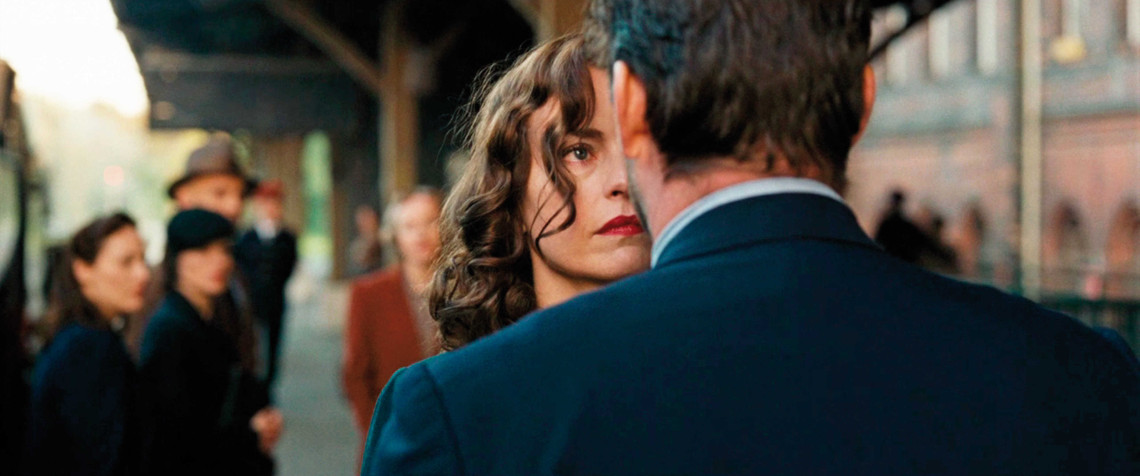On Ricky Gervais’ sorely missed HBO sitcom Extras, Kate Winslet makes an appearance as a funhouse-mirror version of herself while shooting a Holocaust picture. In an extremely candid moment between takes, she confides in Gervais’ sad-sack Z-lister Andy Millman, “We don’t really need another film about the Holocaust, do we? It’s like, how many have there been? We get it, it was grim, move on.” Harsh words, but she’s not entirely off base. There are more films about the Holocaust than any other war, and they necessarily retread a lot of the same themes—universal, ageless ones that are nonetheless well-covered.
Holocaust films generally invite viewers to gape in horror at the depths of man’s inhumanity to man and find inspiration in the perseverance of the spirit during times of unimaginable tribulation. These are no minor accomplishments, mind you; it’s just that they’ve been done. Just look at the length of Wikipedia’s running list of Holocaust films. One film not included on that list is Christian Petzold’s newest offering, the beguiling psychological thriller Phoenix. It takes place in war-torn Germany shortly after the Holocaust, when the harried survivors were staggering home and attempting to reclaim some sense of normalcy while their shattered nation began to piece itself back together. The bullets have stopped flying, though war-hardened street toughs still lurk behind the mountains of rubble strewn across Berlin. The specter of the Holocaust looms large over each frame of the film, the unseen horrors informing dynamics between characters, volumes of script communicated in what’s left unsaid. In turning its focus to the process of recovery after the tragedies had played out, Phoenix addresses a whole new set of ideas for the Holocaust subgenre, and unearths difficult truths about the methods through which nations and their citizens move forward.
Read enough scholarship about postwar Germany, and you’ll run afoul of a real monster of a word, vergangenheitsbewältigung. In the simplest terms, it translates to English as “the process of coming to terms with one’s own past,” and as such, it’s bandied about quite a bit during discussions of Germany’s years following the surrender. (You’ll notice that America, a country that has played it pretty aloof when it comes to formally recognizing the darker elements of its own origin story, has no equivalent term.) The essence of Germany’s vergangenheitsbewältigung focuses on a nationalized sense of guilt, promoting a widespread recognition of the Holocaust and fostering an understanding of the situation’s gravity. Postwar dictates were crafted specifically to reestablish positive relations with Jewish Germans, but of course, the matter was nowhere near that simple. Anti-Semitic sentiment clung to the country like a nasty odor for years after 1945; many reactionary political leaders blamed the economic ruin and complete obliteration of the Berlin infrastructure on the Jews, and with citizens all too eager to scapegoat someone for the massive deluge of large-scale problems, the difficulties were far from over for the Jewish population.
Nelly Lenz, the enigma played by Nina Hoss at the center of Phoenix, is one such Jew. She returns to Berlin in search of her husband Johnny (Ronald Zehrfeld) so that she may resume what’s left of her life, though that’s become impossible. For one, he doesn’t recognize her—terrible injury and reconstructive surgery have left her face irreparably damaged. She’s a stranger to her loved ones. Furthermore, Nina’s been warned that Johnny may have had something to do with her arrest, outing her to the Nazis in an effort get his mitts on her fortune. When Johnny sees this woman who resembles his supposedly late wife, he immediately cooks up a plan for Nelly to pose as herself and collect the errant inheritance, and she goes along with it, if only so that she might scout out his true intentions. Like Vertigo dressed in period finery, Johnny goes to work outfitting his fake/real wife with the hairstyle, wardrobe and demeanor of her former self.
Here, Petzold goes right for the jugular with his allegorical underpinnings. Like the Jewish citizens of Germany, Nelly returns home profoundly changed by the realities of war, both inside and out. And just as the local non-Jews were all too eager to spackle over the fissures caused by this heinous genocide, Johnny intently restores Nelly to her pre-war glory through superficial means. (Petzold even goes so far as to make Johnny’s impetus for the whole charade financial in nature, reflecting the hurting German economy after the devastation of the war.) Petzold unforgettably seals his allegory in a jaw-dropping final scene, offering a critique of Germany’s reluctant vergangenheitsbewältigung by indelibly revealing that no one can fully conceal the past. Some things, whether it’s a serial number tattoo or the remembrances of inhumanity still fresh in the national memory, don’t fade away. Nelly has the benefit of making her true pain known through the immediate, unmistakable power of her singing. The Jewish citizens in the wake of the Holocaust had no choice but to continue on under national scorn and neglect.
Petzold sets up a clever one-two punch with Phoenix. Get too preoccupied with the historical subtext, and the Hitchcockian psychodrama sneaks up on you; fixate on the crackling thriller of obsession and desperation, and then watch as the symbolic meaning slowly presents itself. Petzold keeps Phoenix so refreshingly free of the museum-quality hindsight that turns lesser pictures into phony edutainment that it hardly feels like a Holocaust movie at all. It’s simply a movie about the Holocaust.


















One thought on ““Phoenix” Is The Cure for The Common Holocaust Movie”
Pingback: Dissolve On (08/15/2015 – 08/22/2015) | The-Solute